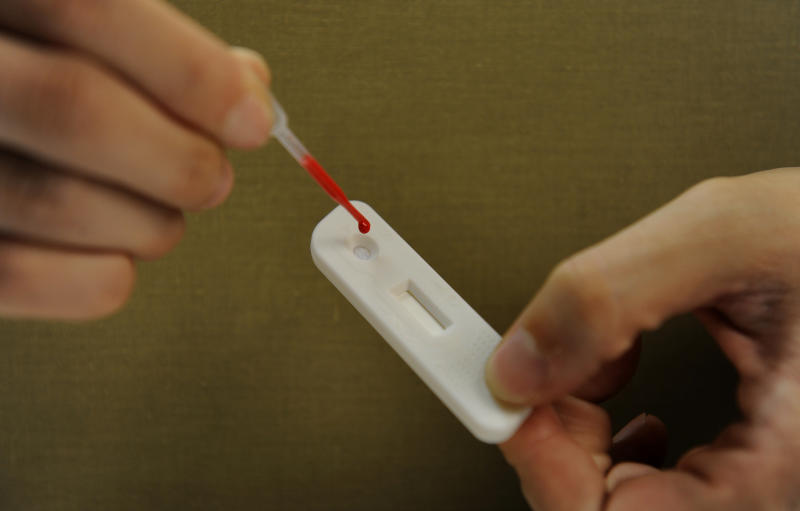New HIV cases this year likely to dip below 300 for first time since 2003
Sign up now: Get ST's newsletters delivered to your inbox

A posed photo of a person using a do-it-yourself kit that tests for the human immunodeficiency virus.
PHOTO: ST FILE
SINGAPORE - The number of Singaporeans and permanent residents diagnosed with human immunodeficiency virus (HIV) this year is projected to drop below 300 for the first time in 17 years.
From January to October this year, there were 220 newly diagnosed HIV cases, said the Health Ministry (MOH) on Tuesday (Dec 1), which was World Aids Day.
The last time case numbers remained below 300 was in 2003, when there were 242 cases.
HIV infections rose steadily since the first cases were reported here in the mid-1980s, hovering between 300 and 500 per year from 2004 to 2017.
Since 2012, however, when there were 469 new cases, there has been a general downward trend in the number of new patients with HIV infections.
Doctors attribute the marked reduction in new HIV cases this year to safe distancing measures due to the pandemic, and the circuit breaker from April to June.
"Fear of Covid caused people to minimise social interactions and basically stay home. Gatherings and night life were all affected," said Dr Colleen Thomas, medical director of the Saint Jude Centre of Internal Medicine at Mount Elizabeth Novena Specialist Centre.
Infectious diseases specialist Leong Hoe Nam from Mount Elizabeth Novena Hospital said: "With restricted mobility and less meet-ups, the chances of sexual encounters in non-monogamous relationships were reduced."
But he also noted that some people may have been infected with HIV who did not get tested because of the pandemic, and would not be reflected in the figures.
"There might have been reduced testing this year due to Covid. People may have postponed the HIV testing as they were frightened of coming forward to see the doctor or going to hospitals," said Dr Leong.
Ms Sumita Banerjee, executive director of non-profit Action for Aids Singapore said a "much lower" number of people came for testing at its anonymous testing site this year, compared with previous years, due to Covid-19.
Of the 125 reported in the first half of the year, 90 per cent were male, and about four in 10 were aged between 40 and 59 years old.
The ministry also said 54 per cent had late-stage HIV infection at diagnosis, which is higher than the 49 per cent reported for the same period last year. Sexual intercourse remains the main mode of HIV transmission, accounting for 96 per cent of the cases. Homosexual transmission was the mode of transmission for 46 per cent of all cases, while 40 per cent were from heterosexual transmission, added the MOH.
Mr Rayner Tan, a doctoral candidate at the Saw Swee Hock School of Public Health who has conducted research in HIV and sexually transmitted infections, noted the steeper drops in yearly cases after 2017, attributing it to the rollout of the new HIV preventive drug - HIV pre-exposure prophylaxis (PrEP) - in late 2016 in Singapore.
The antiretroviral medication is taken by HIV-negative individuals to prevent HIV infection.
Since 2018, yearly cases have hovered in the low 300 range, down drastically from 434 cases in 2017.
Since 2018, yearly cases have hovered in the low 300 range, down drastically from 434 cases in 2017.
"Research underpinned both the efficacy of PrEP, as well as its acceptability and higher uptake among homosexual and bisexual men," said Mr Tan. "If we are able to scale up access to HIV PrEP, our modelling studies at the school suggest that it is possible to eliminate the onward transmission of HIV as early as 2030."
More than half of the cases reported this year were detected by HIV tests done in the course of medical care, while 15 per cent of cases were detected through voluntary HIV screening, down from 19 per cent last year.
The number of homosexuals and bisexuals who had their HIV infection detected through voluntary screening was almost twice that of heterosexuals.
The ministry said that those engaging in high-risk sexual behaviour, such as having multiple sexual partners or engaging in casual or commercial sex, are strongly advised to use condoms to reduce their risk of HIV infection and other sexually transmitted infections.
MOH and the Health Promotion Board urged individuals at risk of HIV infection to go for regular testing, which can help diagnose patients in the early stage of infection.
"With early and effective treatment, persons living with HIV can delay the onset of acquired immune deficiency syndrome (Aids) for many years and continue to lead an active and productive life," said the ministry.


